
| Interview with Natalia Wächter |
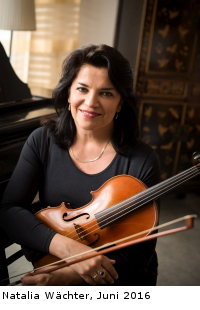 About her musical development in Moscow and her studies of the viola with Yuri Bashmet
About her musical development in Moscow and her studies of the viola with Yuri BashmetNatalia Wächter was born 1964 in Moscow, Russia. She was brought up in a musical family and started to have violin lessons when she was 6 years old. With 12 years, she changed to viola. Ms. Wächter studied at the Moscow Tchaikovsky conservatory from 1982 to 1987 by the famous professor Yuri Bashmet. After her studies, she played viola under the leadership of Alexander Lazarev the chief conductor at the Bolshoi Theater in Moscow, before she moved to Germany in 1989. From 1990 to 1991 she was a solo viola player at the philharmonic orchestra in the city of Heidelberg. Since 1991 she is part of the Stuttgarter Philharmonics.
Today we are thankful and happy to welcome Ms. Wächter and will interview her to our blog-series «Stories around the viola» and especially to give all the readers a few insights to the multifaceted life of this musician. The interview is led by Mascha Seitz, free lyricist and designer for Music4Viola. The interview was done in German and has been translated to English by Sarah Graf.
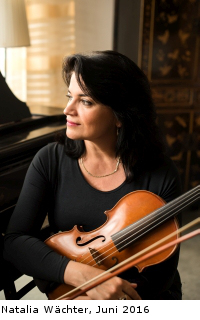 Music4Viola: Misses Wächter, thank you so much that you found time to answer our questions. You studied over 30 years ago. How lively are the memories to that time?
Music4Viola: Misses Wächter, thank you so much that you found time to answer our questions. You studied over 30 years ago. How lively are the memories to that time?Natalia Wächter: The memories are still very alive, especially the memories of my study time. I was at the Gnessin School in Moscow, a special music school. They have entry exams for 6 year old children. We needed to sing a song, clap multiple different rhythms and without looking at the piano we had to identify the played tone by ear. I was accepted and started my violin lessons at that very school. It was a very intensive musical early education.
Two times a week we had instrumental lessons, in my case the violin. In addition to that I had piano lessons with seven years of age and later as well lessons in chamber music. In the morning we usually had school of general educations and in the afternoons the musical subjects like solfeggio, music theory, music history and theory of harmonies.
The fascinating things at this school were the teachers. There is a better fitting word to describe it: enthusiasts. They taught us with heart and souls and never cared about the time. If it was necessary they invested further hours to care about their students with more intensity. They treated all students like their own children, which was very motivating and most appreciated.
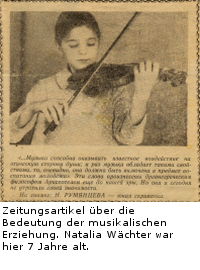 Music4Viola: How come that you changed from the violin to the viola?
Music4Viola: How come that you changed from the violin to the viola? Natalia Wächter: I played the violin up to the 4th class. Everything went well till I broke my fingers twice within the age of twelve. First the little finger on the right hand and only two weeks after removing the cast, I broke the ring finger on my left hand. It was a pretty bad fraction, because the bones were displaced. The finger grew together wrong and stayed crooked. It became very difficult to play the violin fluently, which was the end of me playing that beautiful instrument. All I wanted was to stay at the school. We all looked for possible solutions, which instruments I will be able to play. My dream was to play the harp, but lucky me, my mother told me «it would be too heavy to lift and to carry around». (Laughs) Eventually the decision was made, which was a hard fate to carry at that moment: The viola.
There was nothing else I could do.
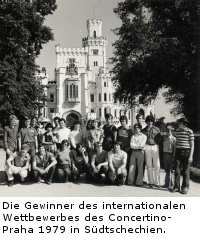 The distance of the tones is bigger which enabled me to play fluently with my crooked fingers. In this time there was a saying: Everyone who could not play the violin good enough, plays the viola. This prejudice might be true in a certain way, because the literature for viola is not as complicated as the once for the violin.
The distance of the tones is bigger which enabled me to play fluently with my crooked fingers. In this time there was a saying: Everyone who could not play the violin good enough, plays the viola. This prejudice might be true in a certain way, because the literature for viola is not as complicated as the once for the violin.The whole circumstance was a shock to me and I did not wanted to play that instrument. However, when I first got a viola and played it for a little while it felt like as we were the perfect match. My viola teacher was incredibly motivating and gave me the freedom to develop my gift and own style. Everything became better, it seemed like a miracle. My development moved on quickly. In my first concert I played the sonata by Telemann in a-minor. I soon started to play chamber music as well. With 15 years of age I won the first price as a member of the piano-quintet in an international competition called Concertino-Praha in Czechoslovakia. It was an incredible experience.
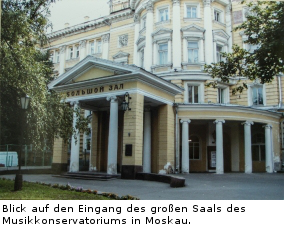 Music4Viola: Now to your student days. How did you experience Yuri Bashmet as a person and teacher? What did he give you on a musical as well as humanly level?
Music4Viola: Now to your student days. How did you experience Yuri Bashmet as a person and teacher? What did he give you on a musical as well as humanly level?Natalia Wächter: At the school I always saw myself, I would not say as a star, but as a very good viola player. I really thought I was playing good and clean. At the first lesson with Yuri Bashmet I was shaky and nervous. He liked my playing but then he started to play along side me, taught me in a gentle and subtle way that I did not play as clean as I thought I would. At that moment it hit me because I always thought I would not have a problem with my intonation.
I had one of my key experiences for my further viola playing after his explanation to focused intonation. We trained that with only one tone, over and over again. After I finally was able to play the focused intonation with every tone, my playing suddenly was louder and more intensive. I was able to hit all the harmonics that are available in one tone and the sound increased many time over. This key experience gave me the understanding that you cannot play music without this very way of intonation.
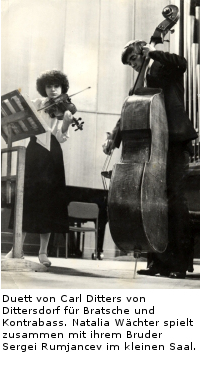 Another very important point that Bashmet taught me was his tone arrangement. The importance by playing viola is to dig deep to be able to make this typical sounds. The instrument sounds, as I would say, juicy and full like a nice mezzo-soprano. That is probably why I felt so associated to this sound, soft and full-bodied tones, because of what I learned from Bashmet.
Another very important point that Bashmet taught me was his tone arrangement. The importance by playing viola is to dig deep to be able to make this typical sounds. The instrument sounds, as I would say, juicy and full like a nice mezzo-soprano. That is probably why I felt so associated to this sound, soft and full-bodied tones, because of what I learned from Bashmet.Another very special thing: In the lessons with Yuri Bashmet his students learned to see the music in pictures. The first piece I played with him is the perfect example. Prelude of the cello suite in G-major by Johann Sebastian Bach. I started to play and it sounded like an etude. Bashmet then said: «It sounds nice, but what are you thinking while playing the music?» He then added: «Imagine it is Christmas, a tree in the middle of the living room. Slowly you start to decorate the tree. There comes a fairy, there a shining star and then the lights. More and more lights. At the end you not only have the finished tree but as well the spirit and the atmosphere.» This was as well a key experience and it was something that I learned for life. For me, Bashmet was and is the best viola player. I admired him very much and still am a great adorer.
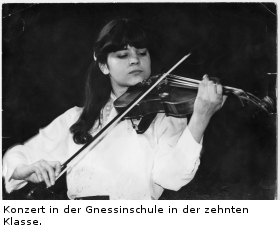 Music4Viola: Which music piece do you like most and which composition would you banish from the books?
Music4Viola: Which music piece do you like most and which composition would you banish from the books?Natalia Wächter: I find it a pity that a genius composer like Wolfgang Amadeus Mozart never composed a concert for viola. However, there is this beautiful Concertante in Eb-major for viola and violin. This very piece is my favorite and I even had the chance and opportunity to perform that composition with my husband Matthias Wächter, a concertmaster at the Stuttgarter Philharmoniker.
There is as well a beautiful recording by Yuri Bashmet and Vladimir Spiwakov.
What I also always liked to play is a concert piece for viola and piano by the Romanian composer George Enescu, who lived in France. Especially with this particular piece you are able to show all the different facets. It is very nice to play.
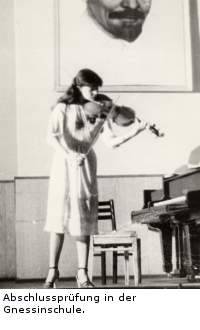 Of course, THE concert for viola is the one from Béla Bartòk. It is a symphonic and technical very demanding and virtuosic piece. The orchestra not only plays a supporting role, but also shapes the piece. This concert should be played by every viola player.
Of course, THE concert for viola is the one from Béla Bartòk. It is a symphonic and technical very demanding and virtuosic piece. The orchestra not only plays a supporting role, but also shapes the piece. This concert should be played by every viola player.What I would love is to rehearse the concert for viola by Alfred Schnittke. This concert was dedicated to Yuri Bashmet. It is a very thrilling and also very challenging piece. I studied by Bashmet when he met Schnittke and he spoke with him about the piece. Bashmet talked a lot about it and was very excited.
What I don`t like is the concert in D-major by Karl Stanitz. Every viola player knows it, because it is required by every orchestra rehearsal. This is not my music.
A piece with a very central importance to me is the viola sonata opus 147 by Dimitri Schostakowitsch. It is his last completely composed piece and was dedicated to Fjodor Druzhinin, who studied by Yuri Bashmet. Schostakowitsch must have known that he would die soon. It is a kind of personal requiem in which he deals with life and death in his own way. All musical characteristics are found in this sonata: grief, joy, sarcasm, irony and love. I am a very proud and happy viola player, because of this very piece by Schostakowitsch and thankful that he especially composed a work for «my» instrument.
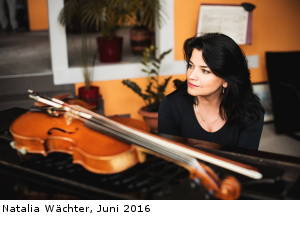 Music4Viola: At the end, what would you like to say to viola students or aspiring viola players?
Music4Viola: At the end, what would you like to say to viola students or aspiring viola players?Natalia Wächter: In my eyes it is the most important thing to find your personal and special viola sound. For me it is that very sound that touches me. I have the privilege that the viola sounds, especially in the higher tones, a little bit like the violin and in the lower tones you have that very unique sound. It is actually an instrument between violin and cello. Sometimes I wish at the orchestra rehearsals, when I listen to young people, they would play that radiant sound above, like playing a violin and on the other hand the deep sonorous and juicy tone. Then you have found the soul of the instrument.
Of course it is very important to visit different concerts. Unfortunately I don`t see students very often in the concert halls. There is so much to learn from other musicians, which you should not miss in your student days.
Music4Viola: Misses Wächter, thank you again for this interview.
Add comment
| Blog overview |
» To the blog list
| Newsletter |
 Do you don't want to miss any news regarding viola anymore? Our newsletter will keep you informed.
Do you don't want to miss any news regarding viola anymore? Our newsletter will keep you informed.» Subscribe to our Newsletter for free
 Visit us on Facebook. The news articles are also posted.
Visit us on Facebook. The news articles are also posted.» To Facebook